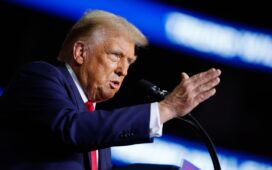Volkswagen ID.3 electric cars stand in the storage tower following assembly in Dresden, Germany. … [+]
Volkswagen reported strong operating profits in the 1st quarter and expressed hopes earnings will reach the target range for 2023. But a European economy likely to be stagnant at best won’t help, while VW’s flagship electrification project is sputtering as competition led by China will undermine margins.
Chinese electric car competition will be an accelerating threat to all European carmakers. Chinese competition is expected to gouge €7 billion a year from their profits by 2030 unless action is taken, according to a report.
Although VW’s operating profit fell to €5.7 billion in the 1st quarter from €8 billion in the same period last year, but after excluding the impact of commodity trading, it rose 35% to €7.1 billion for a margin of 9.3%. The target for the year remains in the 7.5 to 8.5% range.
The Financial Times Lex column said VW faces slowing growth, as the likes of Tesla expand.
“CEO Oliver Blume hopes to boost car sales and avoid a collapse in prices. Neither looks easy,” Lex columnist Neil Unmack said.
“Carmakers like VW are entering a new era, where growth is slow, and competition rising,” Unmack said.
Investment researcher Bernstein agreed the first quarter performance was impressive, but profit targets were “ambitious”.
Volkswagen presents its new ID.7 electric sedan at an official debut event on April 17, 2023 in … [+]
“Achieving 2023 margins of 8.0% remains a challenge, given the margin dilution implied by the necessary catch-up in Volume Group and Premium Group volumes, but the CFO did highlight improved raw materials costs helping reduce costs,” Bernstein said in a report.
Investment bank UBS said the solid performance of VW’s premium (Audi, Porsche) and luxury brands (Bentley, Lamborghini) helped the first quarter’s solid performance, but the workaday subsidiaries like VW’s own brand, Skoda and SEAT will be a drag on results.
“Our thesis for VW’s mass-market brands hasn’t changed and we still expect oversupply emerging in the course of 2023 with more downward pressure on price and mix as the existing backlog gets executed,” UBS said in a report.
Next year will bring increasing pressure on profits, UBS said.
VW’s battery electric vehicles (BEVs) will also come under pressure as competition intensifies. VW led the pack in the early stages of vehicle electrification and has now been joined by other European manufacturers. But it’s the threat from Chinese manufacturers that represents the biggest threat.
“Intense price competition in BEVs will make it very tough for VW to be profitable with its BEV product range, and this will be combined with a higher and dilutive BEV share in the mix,” UBS said.
This threat from China will accelerate during the rest of the decade and will seize a big chunk of BEV sales and profits from Europeans, according to a report from Allianz Trade, a subsidiary of German insurance company Allianz.
Allianz Trade said sales of Chinese BEVs will cost European automakers €7 billion a year in lost profits by 2030 unless the European Union (EU) takes action. Action should include tariffs. Chinese vehicle imports in Europe are subject to a 10% import duty. The report said other actions should include subsidies to boost European battery production and technology development, while Chinese manufacturers should be persuaded to set up factories in Europe.








